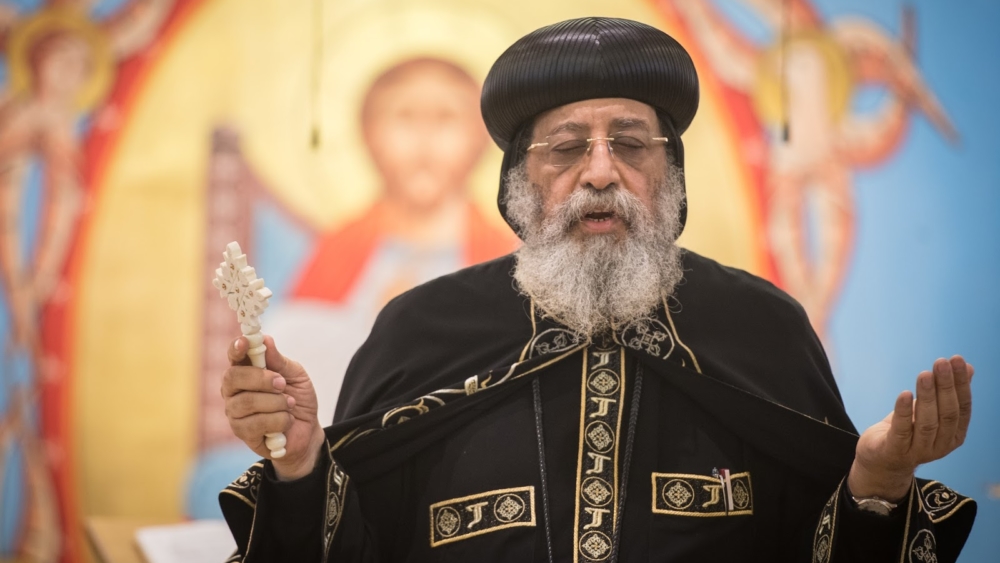The Coptic Pope, His Holiness Tawadros II, says he has only one feeling towards ISIS – and that is love.
Laying the foundation stone of a new St Mark Church in Canberra yesterday, the leader of the Egyptian church was humble, learned, gracious and, above all, forgiving.
He spoke about his suffering church. He said that he only had one feeling towards ISIS, and that was love. He said that he forgave them and that the Coptic Church forgave them.
I was one of the few outsiders to be invited.
He said that his church had always been a martyrs’ church. Martyrdom was part of their life, part of their witness.
Referring to the Palm Sunday bomb attack in St George’s Church, Tanta in north Egypt, the Pope said ISIS had shortened their journey through this troubled world to eternal life with God. This was part of the great privilege of sharing in the sufferings of Christ.
Pope Tawadros gave me a symbolic gift. In return, I showed him a rare and beautiful Coptic Scripture from Bible Society Australia’s historic library.
He and his Coptic Christian flock set us an example of how to follow Jesus’ teachings directly and without question.
He held the book with reverence for he above all people knew how much it symbolised the story of his people. It was the Book of Psalms, printed in 1826. It is set in two columns, Coptic on the left and Arabic on the right.
It has been the story of this Coptic Church to be immersed the Arab world. Even in their own churches the ancient Coptic language is being used much less and giving way to Arabic.
Pope Tawadros is an impressive Christian leader. Here in Australia where Christians have suffered very little, he and his Coptic Christian flock set us an example of how to follow Jesus’ teachings directly and without question. We are to forgive our enemies, even ISIS. We are to love our neighbour no matter how hard that seems to be.
The prophecy of Hosea 11:1 matters deeply to the Coptic Christians. “Out of Egypt I called my Son.” They know from Matthew’s use of that prophecy (2:15) that the people of Egypt protected the life of the Christ child when King Herod tried to kill him. It is inscribed on their churches. It is inscribed on the gift Pope Tawadros gave me.
That gift has a second verse inscribed on it, 1 Corinthians 13:8 in both Arabic and English, the verse His Holiness has chosen as his own personal motto: Love Never Fails’.
The world should not be surprised that ISIS terrorists chose Palm Sunday – the day Jesus made his entry into Jerusalem – to attack Coptic Christians. ISIS knew that Coptic churches in Egypt would be crowded. They knew that the explosion would receive maximum publicity. Twenty-nine people died inside the church that Palm Sunday and 71 were injured.
Some of the congregation were still preparing their palm branches for the procession, branches which were to be stained red with their blood. “Jesus’ followers carried their palm branches with joy,” said one Coptic Christian, “but we cannot forget that the procession was also taking him to his death.”
The people of Egypt protected the life of the Christ child when King Herod tried to kill him.
A few hours later an ISIS suicide bomber attacked St Mark’s Church in Alexandria. The police had been alerted and were guarding the church. They were able to intercept the bomber but seven police were killed when he detonated his bomb, together with nine other people. Inside, the service was being led by.
Coptic is simply the old word for Egyptian. The Coptic church is one of the world’s most ancient, being founded in 42 AD by St Mark. They became a thriving Christian people in Egypt and throughout the north of Africa for six centuries until Muslims invaded in 639 AD. How easy it is for us to forget that Muhammed was not even born until 600 years after Jesus.
For the next millennium and a half, the persecuted Coptic Church has held to its faith against incredible opposition and death. “The Coptics are our favourite prey,” said an ISIS spokesman on a propaganda video last February. “We are martyrs,” wrote Coptic scholar Samuel Tadros, “and we are the sons and daughters of martyrs.”
Email This Story
Why not send this to a friend?





